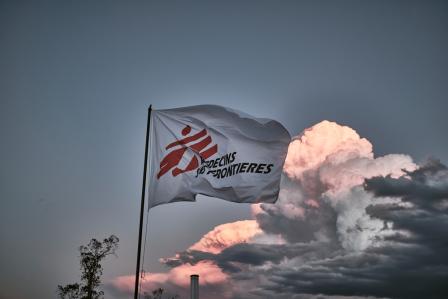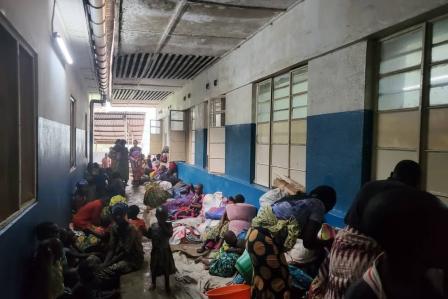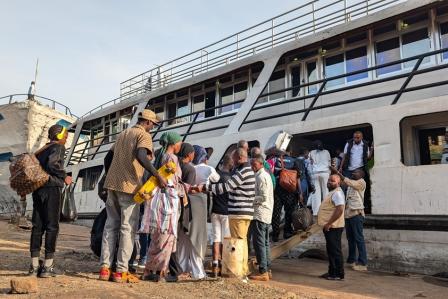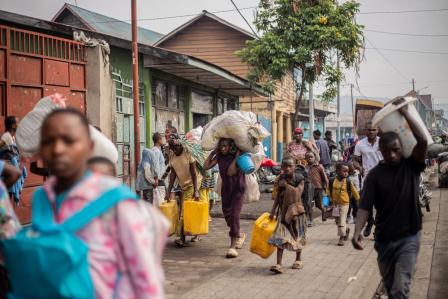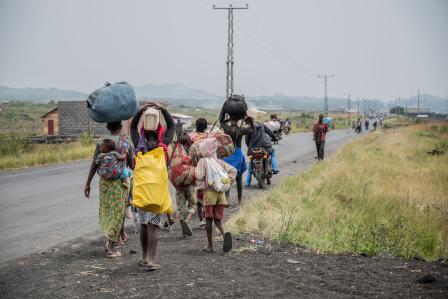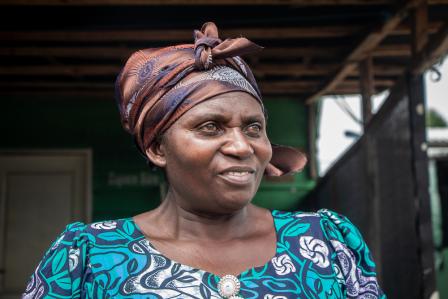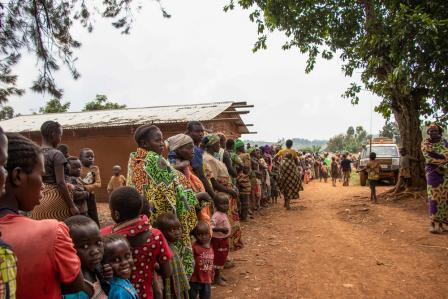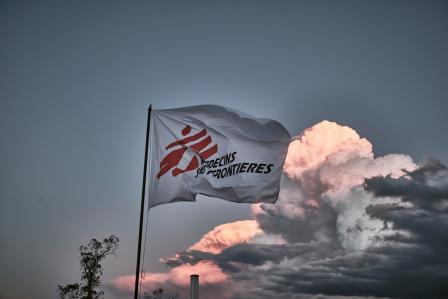DRC: Assistance needed for people leaving and staying in Goma following weeks of violence
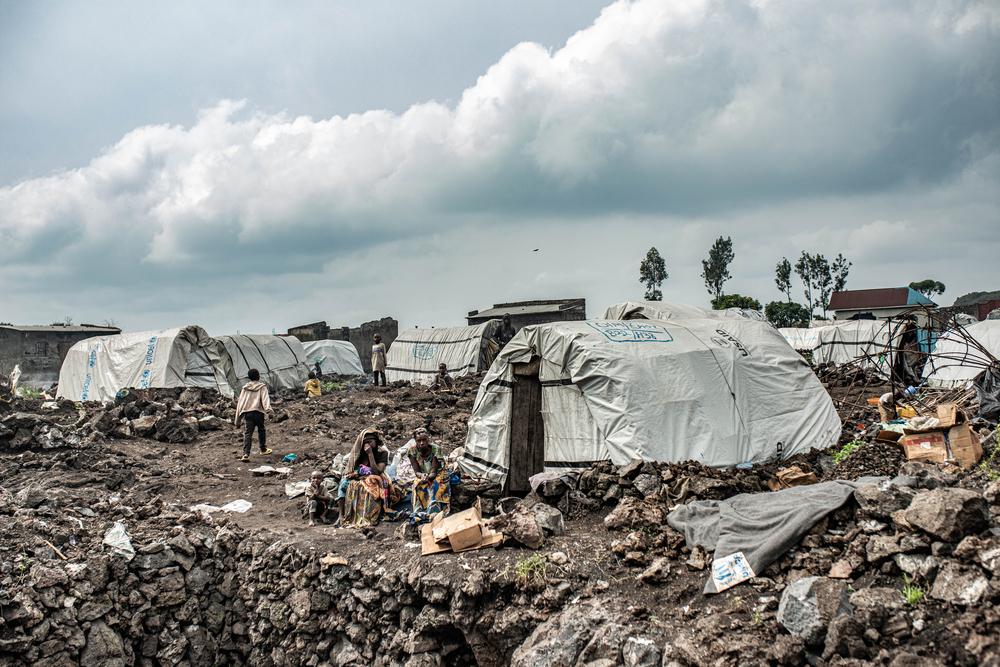
Numerous internally displaced people in the Bulengo camp, located next to Goma, are leaving the camp, while others are staying, sometime too afraid to hit the road. Democratic Republic of Congo, February 2025. © Daniel Buuma
Hundreds of thousands of displaced people sheltering in camps in and around the city of Goma, in Democratic Republic of Congo’s North Kivu province, have been severely impacted by extreme violence over the past three weeks, and many are now leaving the camps, according to Doctors Without Borders/Médecins Sans Frontières (MSF) teams. As departures from the camps accelerate, Doctors Without Borders calls for the movement of people to be voluntary and for urgent humanitarian assistance to be provided wherever it is most needed.
Since fighting subsided in Goma, and with M23/AFC (Alliance Fleuve Congo) now in control of parts of the region, many movements have been observed in the displaced persons camps and on the roads. Some camps are emptying at speed, with large numbers of people heading towards neighbouring areas, including towards their places of origin. Doctors Without Borders staff have also observed displaced people heading towards the city of Goma, while some displaced people from camps that have been destroyed are heading for the remaining camps west of Goma.
"This week, some camps have been largely emptied in just a few hours,” says Thierry Allafort-Duverger, Head of Doctors Without Borders Emergency Programmes in Goma.
“People are leaving with what little they have. We don't know in what conditions they will travel home or what they will find there. But it is crucial that these movements are voluntary and that the reception conditions in their areas of returns are safe," he continues.
Displaced people appear to be leaving the camps for a number of reasons. Many residents of the camps mention evacuation orders that were reportedly given by members of the M23, while others receive official messages to the contrary. Others express a desire to leave after years surviving in desperate conditions. Some people, however, are choosing to stay on in the camps, unsure of security conditions and what they may find at home.
The messages remain confused and unclear, but what is certain is that the population is very worried, oscillating between rumours and reality. Families are extremely vulnerable. Humanitarian aid is more than necessary, both for those who are leaving and those who are staying. Unfortunately, we are seeing that a number of NGOs have been unable to resume their activities or have suspended their services, dismantling their structures in the camps.Thierry Allafort-Duverger,Emergency Head
The population’s vulnerability and need for assistance is illustrated by the fact that, in recent days, Doctors Without Borders teams have witnessed some people dismantling humanitarian facilities and taking with them anything that could potentially be of use: chairs, metal sheeting, tarpaulins, ropes and so on. Other people, however, have tried to protect Doctors Without Borders structures from looting.
"This happened in several places where Doctors Without Borders was working, such as Lushagala, where a Doctors Without Borders clinic and a cholera treatment centre disappeared in the space of a few hours on Monday," says Allafort.
For people leaving the camps, Doctors Without Borders is particularly concerned about the level of access to health services when they get to their places of return. After several years of war, many health facilities have been looted or abandoned and will be unable to provide adequate medical care to those who need it, either now or in the longer term.
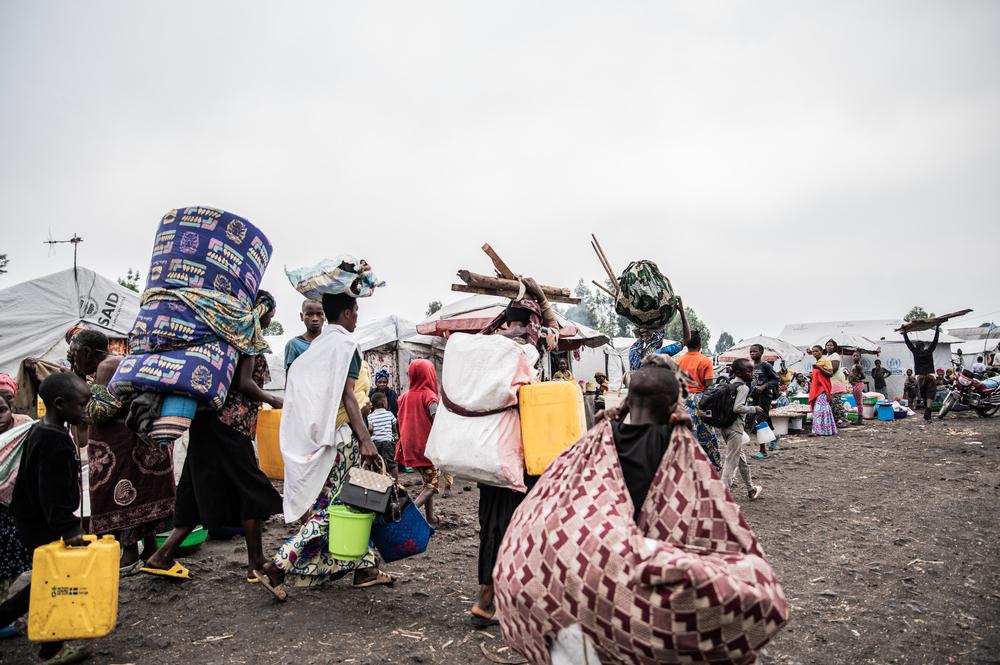
Families leave the Lushagala and Bulengo camps, carrying their belongings on their backs and heads. Some of the displaced people take to the road on foot, telling themselves that it is not far and that it is better than dying in the camp. Democratic Republic of Congo, February 2025. © Daniel Buuma
For the past three years, living conditions in the camps around Goma have been desperate, even scandalous. But the situation in people’s places of return is likely to be equally disastrous if NGOs, UN agencies and authorities fail to provide the minimum level of essential services. Humanitarian organisations must be guaranteed access to all places of return, says Doctors Without Borders, and returnees must be able to access essential health services, including support for survivors of sexual violence. Failure to provide these services risks exacerbating people’s health needs.
To ensure a minimum level of healthcare for displaced people in areas of return, Doctors Without Borders has set up mobile clinics on roads leading out of Goma to the east and the north. Doctors Without Borders teams are also carrying out assessments in the areas to which people are returning.
Even as the situation in and around Goma is evolving rapidly, Doctors Without Borders teams continue to provide vital assistance to people still living in the camps. This includes providing medical care, malnutrition treatment, cholera treatment and care for survivors of sexual violence. Doctors Without Borders is also distributing clean water and food and reinforcing sanitation in the camps. Meanwhile Doctors Without Borders medical teams in Kyeshero and Virunga hospitals in Goma are caring for people wounded in the violence.
Will you support our emergency response work?
Help us provide lifesaving medical care during emergencies by making a donation today.
